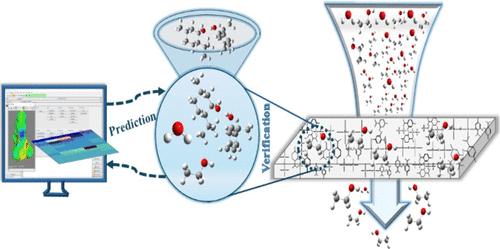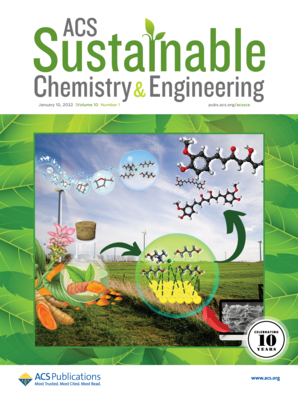Simulation-Driven Design and Synthesis of DES-PDMS Membranes for Enhanced Ethanol Pervaporation
IF 7.1
1区 化学
Q1 CHEMISTRY, MULTIDISCIPLINARY
引用次数: 0
Abstract
Efficient separation of ethanol from water is a critical challenge in the biofuel industry, where traditional methods often fall short in terms of energy efficiency and selectivity. To address this, we explore the potential of novel deep eutectic solvents (DESs) to enhance the performance of pervaporation membranes. Using the Conductor-like Screening Model for Realistic Solvents (COSMO-RS), we identified a promising menthol/thymol based DES with exceptional hydrogen bonding and selectivity properties. Incorporating this DES into poly(dimethylsiloxane) (PDMS) membranes led to significant improvements in separation efficiency. Our DES-PDMS membranes, particularly with a 1:6 molar ratio and 5–10% DES loadings, demonstrated outstanding performance at 60 °C, achieving total fluxes of 0.47 and 0.36 kg m–2 h–1, and separation factors of 26 and 33, respectively. These results align well with the COSMO-RS predictions, highlighting the enhanced chemical affinity between the DES and PDMS, which maintains hydrophobicity and reduces water absorption. This study introduces a novel strategy for membrane performance enhancement, offering significant promise for efficient ethanol separation and broader applications in advanced separations.

模拟驱动设计和合成用于增强乙醇渗透的 DES-PDMS 膜
从水中高效分离乙醇是生物燃料工业面临的一项严峻挑战,传统方法往往在能效和选择性方面存在不足。为了解决这个问题,我们探索了新型深共晶溶剂(DES)提高渗透汽化膜性能的潜力。利用现实溶剂的类导体筛选模型 (COSMO-RS),我们发现了一种很有前景的基于薄荷醇/百里酚的 DES,它具有优异的氢键和选择性特性。将这种 DES 与聚(二甲基硅氧烷)(PDMS)膜结合可显著提高分离效率。我们的 DES-PDMS 膜,尤其是摩尔比为 1:6 且 DES 含量为 5-10% 的膜,在 60 °C 下表现出卓越的性能,总通量分别达到 0.47 和 0.36 kg m-2 h-1,分离因子分别为 26 和 33。这些结果与 COSMO-RS 的预测非常吻合,凸显了 DES 与 PDMS 之间化学亲和力的增强,从而保持了疏水性并减少了吸水性。这项研究提出了一种提高膜性能的新策略,为高效乙醇分离和先进分离技术的更广泛应用带来了希望。
本文章由计算机程序翻译,如有差异,请以英文原文为准。
求助全文
约1分钟内获得全文
求助全文
来源期刊

ACS Sustainable Chemistry & Engineering
CHEMISTRY, MULTIDISCIPLINARY-ENGINEERING, CHEMICAL
CiteScore
13.80
自引率
4.80%
发文量
1470
审稿时长
1.7 months
期刊介绍:
ACS Sustainable Chemistry & Engineering is a prestigious weekly peer-reviewed scientific journal published by the American Chemical Society. Dedicated to advancing the principles of green chemistry and green engineering, it covers a wide array of research topics including green chemistry, green engineering, biomass, alternative energy, and life cycle assessment.
The journal welcomes submissions in various formats, including Letters, Articles, Features, and Perspectives (Reviews), that address the challenges of sustainability in the chemical enterprise and contribute to the advancement of sustainable practices. Join us in shaping the future of sustainable chemistry and engineering.
 求助内容:
求助内容: 应助结果提醒方式:
应助结果提醒方式:


